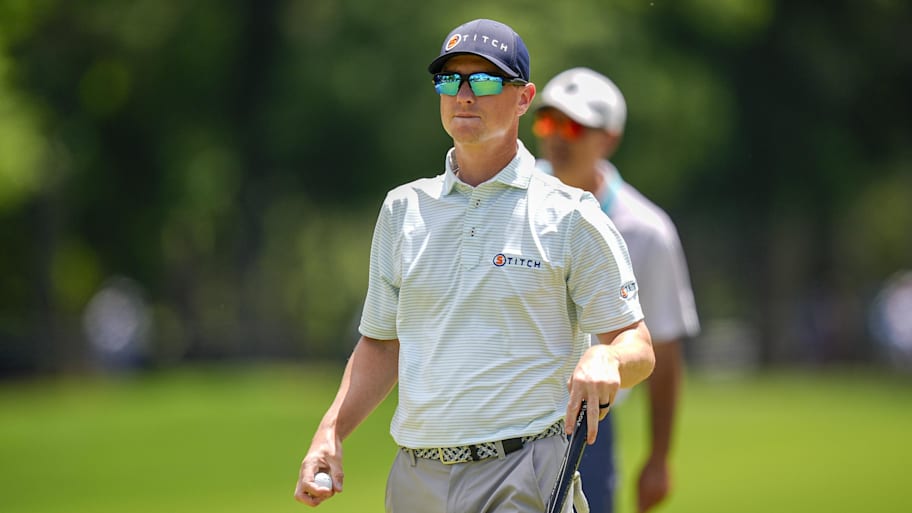“Did I kill someone?”
That was the question Rupe Taylor asked when he woke up in a hospital bed 12 years ago with restraints around his arms and legs after a night of drinking that led to a crash and a DUI arrest.
Now, he’s playing in the PGA Championship.
“I don’t deserve any of this,” Taylor told Sports Illustrated. “It’s something that I truly feel as if God has just kind of blessed me with.
“I don’t take for granted that I’m alive first and the fact that I know I’ve worked really hard to get where I am and I’ve earned it. But in the grand scheme of things, it’s incredibly humbling to be in the position that I’m in, getting to play in a PGA Championship when I certainly doubted if that was ever even a remote possibility.”
Taylor, a 35-year-old from Charlottesville, Va., didn’t play college golf while attending N.C. State. He graduated in 2013 from the Professional Golf Management program and then had teaching stints on Kiawah Island in South Carolina before moving back to his home region.
Drinking, however, was prevalent in his life. One night, Taylor, as a 23-year-old, went to a bar with a friend and got behind the wheel afterward. He doesn’t remember anything beyond that until opening his eyes in the hospital with his mother praying beside him.
Fortunately, he didn’t kill anyone.
“I feel as if God was kind of looking down over me, keeping me safe and keeping others safe around me in my complete blackout drunkenness,” Taylor says.
Taylor has been sober ever since. But the journey to Quail Hollow has still been turbulent at times, both personally and professionally.
“The club I was working for tried to stick by me for as long as they could until it was just a little bit too murky of what was gonna come next,” he says. “So totally understood that. And just being in the court system, not knowing what the future held, I was just hoping that they would see the changes that I was making in my life that would give me a chance to move forward instead of facing very harsh consequences.”
Avoiding a severe punishment for his DUI, Taylor took a job at the municipal course where he grew up playing for $10 a day, working as often and hard as he could.
And that helped him get his career back on an upward trajectory, even though his DUI still causes anxiety in his professional life. Alleviating any uncertainty, Taylor now runs his “Play Better Golf Now” instruction business in Virginia, which is affiliated with Virginia Beach National.
“I still feel like I get overlooked because I screwed up at another job by getting a DUI while I was working at a pretty nice place and that some people just aren’t gonna take a shot on me because they think I’m a loose cannon or something,” Taylor says. “And yeah, I do struggle with the industry as a whole at times if we’re being fully transparent and that’s why I’ve chosen to work for myself at this point because I don’t have to ask for permission for anything and I do everything I can to set myself up for success.”
Taylor hasn’t relapsed, though. Even when his grandfather and father died within a 10-day span, two years into his sobriety, he held firm.
“Fortunately, the substance part of it didn’t really come back into the equation at that point because I was just pretty well set on like I can’t allow these circumstances to give me an excuse to jump back into a life that was obviously not successful under those circumstances,” he says.
And that mindset has allowed Taylor to flourish both on and off the course.
“Rupe is nothing if not determined,” says Jon Guhl, the PGA of America’s CEO of the Middle Atlantic Section. “He has always showed grit on the golf course, so I am not surprised that he showed the same perseverance in his personal life.”
With a top-20 finish in April’s PGA Professional Championship, Taylor punched his ticket to Charlotte, N.C., and will be part of the strongest field in golf. Twenty club pros are teeing it up this week, and for years, allowing teaching professionals to play alongside the world’s best has received criticism for watering down the competition, even with the number of qualifiers being cut in half since 1993.
But without them, there wouldn’t be stories like Taylor.
The gallery for Taylor will include his wife, 18-month-old daughter, along with an abundance of extended family, friends and Guhl.
Taylor doesn’t necessarily feel any pressure to be the next Michael Block, but he’d like to secure a weekend tee time. If he doesn’t, though, he’ll still leave Quail Hollow with a smile.
“This golf course is going to kick my butt this week in a lot of ways,” says Taylor, who will have a former student of his caddying for him. “But I’m going to fight as hard as I can for as long as I can. And if that means that I play 36 holes, if that means I play 72 holes, I’m going to be the happiest person here at the end of the week, no matter what.”
Because when Taylor woke up restrained in a hospital bed, nobody envisioned he would be here. But he’s making the most of a second chance.
“(The PGA Championship) gives you a lot of opportunity to learn about resilience and perspective,” Taylor says. “At the end of the day, I’m at the PGA Championship, meeting Brooks Koepka, Justin Thomas, Scottie Scheffler. Those are all guys that I’ve fist pumped, handshaked, and it’s stuff that I will look back on at some point in my life and be like, ‘Holy crap, that’s the life that I got to live.’”
This article was originally published on www.si.com as This Club Pro Has the PGA Championship’s Best Redemption Story.
